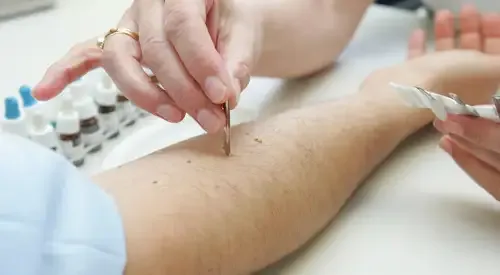Atopic Dermatitis
"A lot of progress has been made in the treatment of atopic dermatitis. In recent years we have been able to incorporate systemic treatments (such as biologic drugs and other drugs that act on the mechanisms of inflammation) on which research continues."
DR. CARMEN D'AMELIO
SPECIALIST. ALLERGY AND IMMUNOLOGY DEPARTMENT

What is atopic dermatitis?
Atopic dermatitis is a skin disease that can affect people with allergies. It is a chronic disorder that usually begins in the first year of life and may persist into adulthood. The main symptom is intense itching and the appearance of eczematous lesions in specific areas, which are worsened by scratching.
Outbreaks may be intermittent or, in severe cases, continuous. They usually improve during the summer months. Secondary infection with staphylococcus is common and further complicates the disease. Different allergens can play a role, since 80% of patients test positive for at least one allergen in diagnostic allergy tests.
Its chronic nature, along with its psychological impact and effect on the patient’s quality of life, makes specialist evaluation and treatment necessary. In some cases, coordinated management with other medical specialties is required to prevent major complications and associated conditions linked to atopic dermatitis.

What are the symptoms of atopic dermatitis?
The main symptom is intense and persistent itching. As a consequence, the patient tends to scratch compulsively, and abrasions appear.
The main sign is dry and recurrent dermatitis. It is characterized by the appearance of red areas on the skin, of varying intensity. In infants, it mainly affects the face, and in adolescents and adults it is located on the extension surface of the limbs, especially elbows and knees, in the form of plaques.
It can be associated with rhinitis, with or without asthma, in more than half of children. These patients usually present allergy to some foods.
Also, patients with atopic dermatitis have a special susceptibility to skin infections.
The most common symptoms are:
- Itching.
- Dry dermatitis.
- Thickening of the skin.
- Rhinitis.
Do you have any of these symptoms?
You may have an atopic dermatitis
How is atopic dermatitis diagnosed?

The diagnosis of atopic dermatitis is made through a thorough examination of the skin, personal and family history, and study of the symptoms.
There is no test to determine whether or not a person has atopic dermatitis, and therefore the tests are aimed at ruling out other diseases.
Patients with atopic dermatitis who come to the Clínica Universidad de Navarra are attended to by a multidisciplinary team, made up of specialists from the Departments of Allergology and Dermatology.
This collaboration helps to ensure that the approach to treatment is the most appropriate to the situation of the disease. In addition, specialists in Infectious Diseases and Microbiology collaborate with these departments.
How is atopic dermatitis treated?
For years, first-line topical treatments applied directly to the skin have been available and proven effective in controlling atopic dermatitis. These medications help reduce inflammation, relieve itching, and improve other characteristic symptoms of the disease.
Frequent hydration with emollients specifically formulated for atopic skin is a cornerstone in preventing flare-ups and exacerbations, while supporting the protection and repair of the skin barrier.
In the last decade, greater understanding of the immunological mechanisms involved in the disease has led to the development of new therapeutic options. Among them are innovative systemic therapies, such as targeted biologic drugs (dupilumab, tralokinumab) and oral JAK inhibitors (upadacitinib, baricitinib, abrocitinib).
These advances open new possibilities for a more personalized approach, allowing for better characterization of the different forms of the disease and optimization of treatment, ultimately leading to significant improvements in patients’ quality of life.
Tips for the prevention of atopic dermatitis outbreaks
- Wear soft, loose-fitting fabrics, avoiding tight clothing or garments that rub against the skin.
- Maintain a comfortable room temperature, avoiding environments that are excessively hot or dry.
- Choose showers over baths, using lukewarm water and limiting the duration to no more than 10 minutes. After showering, gently pat the skin dry without rubbing, and immediately apply moisturizer while the skin is still slightly damp.
- Avoid alkaline or scented soaps. Instead, use soap-free cleansers formulated for atopic skin and free of fragrances. During flare-ups, limit soap use to the armpits and genital area only.
- Moisturize the skin several times a day (at least three), always after showering and while the skin is still slightly damp, following your doctor’s recommendations. Do not apply moisturizer directly on active lesions without medical advice.
- Minimize scratching as much as possible. Keep nails short and, if necessary, wear cotton gloves at night.
- Moderate sun exposure may be beneficial, but always use adequate sun protection (sunscreens suitable for sensitive/atopic skin).
- In summer, after swimming in pools, rinse with fresh running water to remove chlorine and reapply moisturizer.
What clinical trials do we have on Atopic Dematitis?
Department of Allergology
of the Clínica Universidad de Navarra
The Department of Allergy and Immunology of the Clinic is part of the Global Allergy and Asthma European Network, composed of the 25 best departments of Allergy in Europe, chosen for their scientific excellence, multidisciplinary work, teaching and international activities.
We have the most advanced diagnostic techniques, we are at the forefront of research and we collaborate with the best experts. We have more than 50 years of experience in the field.
What diseases do we treat?

Why at the Clinica?
- More than 60 years of experience.
- Pioneers in the technique of molecular diagnosis by microarray.
- Nursing specialized in allergic diseases and their care.








